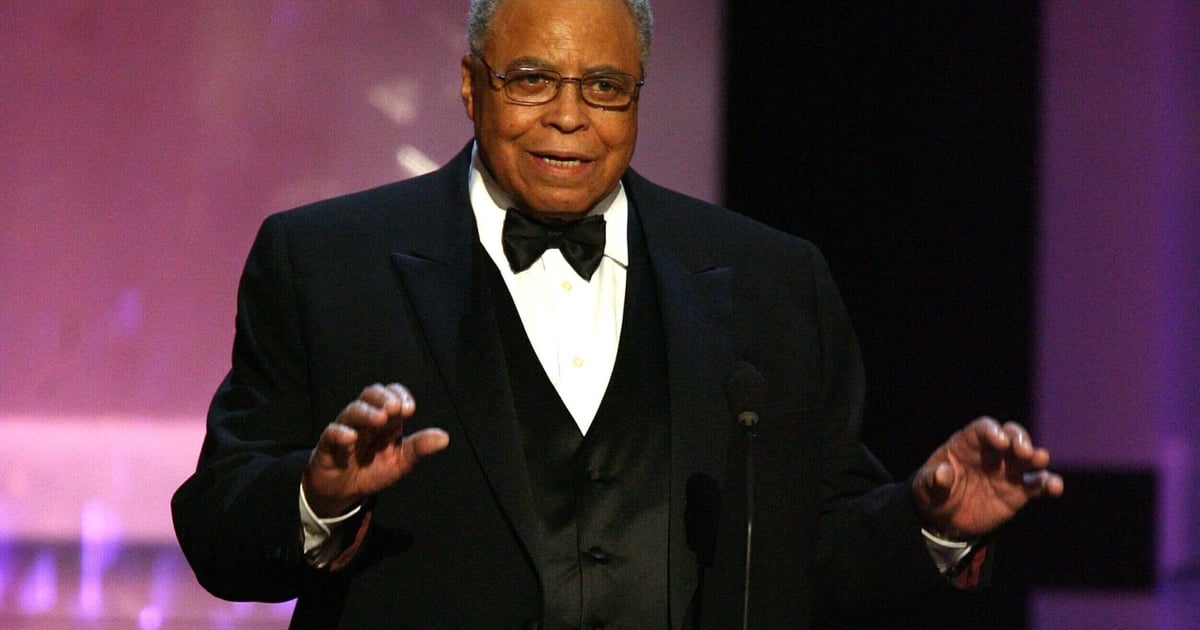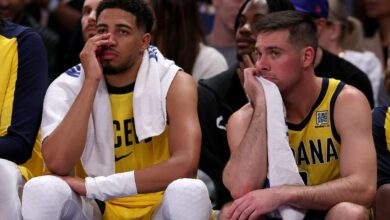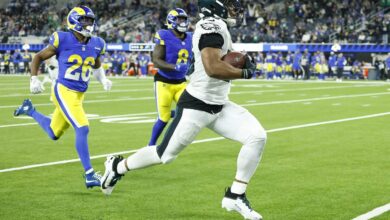James Earl Jones’ voice marked the times, in baseball and beyond

James Earl Jones, who was 93 when he died Monday, will be remembered by baseball purists for the moving, soul-expanding words he spoke in the 1989 film “Field of Dreams.”
Jones plays a fictional writer named Terence Mann, and he’s speaking nominally to Kevin Costner’s Ray Kinsella. But what he’s really doing is speaking to everyone in the audience who has long wondered what happened to the baseball cards they collected growing up. He’s speaking to everyone who’s wondered what Babe Ruth would hit today, or what Shohei Ohtani would hit yesterday. He’s speaking to everyone who’s ever held a baseball glove up to their nose and smelled the leather.
We know this is partly true because of the staging. Mann looks at the camera as he stands on the edge of a baseball field carved out of an Iowa cornfield. But the real magic comes from Jones, who uses his rich baritone voice in a way that makes us want to go outside and build a baseball field:
The one constant through the years, Ray, has been baseball. America has rolled by like an army of steamrollers. It has been erased like a blackboard, rebuilt and erased again. But baseball has marked the times. This field, this game, it is a part of our past, Ray. It reminds us of all that was once good, and all that could be good again.
Those words have become a baseball anthem without music, in the same way that Jones, accompanied by the Morgan State University choir, recited “The Star Spangled Banner” before the start of the 1993 All-Star Game at Oriole Park at Camden Yards.
And yet Jones wasn’t a baseball fan growing up. And he didn’t fall head over heels in love with the game as a result of his appearances in baseball movies like “The Bingo Long Traveling All-Stars & Motor Kings” (1976) and “The Sandlot” (1993), or in the Phil Alden Robinson-directed “Field of Dreams.”
But Marlon Brando wasn’t a mob boss before “The Godfather,” and Margaret Hamilton wasn’t a witch, evil or otherwise, before “The Wizard of Oz.” What we see from Jones in “Field of Dreams” is an actor who pulled all the necessary dramatic levers and pulleys to make become a baseball fan, or, in my case, the kind of baseball fan I remember from my childhood, just two miles from Fenway Park.
In the scene where Kinsella somehow convinces Mann to attend a Boston Red Sox game at Fenway, we see Jones watching the action in a way that struck me the first time I watched “Field of Dreams.” While Costner’s Kinsella is busy writing the name “Moonlight Graham” on his scorecard, Jones’ Terence Mann gives us a look of seriousness mixed with a hint of serenity as he watches the action of the game. In an age before cell phones, before golf, before beer mats, before walk-up music, that was how people watched baseball. It’s such a small thing, but Jones got it.
Yes, it’s the “people will come” rallying cry on the ballpark in Dyersville, Iowa, that transformed Jones into a baseball icon. But it’s what happens just before the speech that made me want to stand up and applaud when I first saw “Field of Dreams.” As Kinsella’s brother-in-law (played by Timothy Busfield, who happens to be a real baseball fan) storms onto the stage to announce that Ray is bankrupt and has to sell the farm, Mann is seen holding a copy of “The Baseball Encyclopedia.” In the pre-Internet era, it was baseball’s bible. And Mann treats it as such. It’s spread across his lap, open, perhaps to the page that contains the lifetime statistics of Shoeless Joe Jackson, Eddie Cicotte, Buck Weaver or one of those baseball-playing ghosts on the field.
That struck a chord with Larry Cancro, a senior vice president for the Red Sox who has worked on the marketing side of things for nearly four decades. He told of a time when he was about 10 years old and his family was visiting relatives in Melrose, Mass. “I was sitting there with my three sisters,” he said, “and my dad’s cousin had a copy of ‘The Baseball Encyclopedia.’ It was the first time I’d ever seen one. And I started flipping through it. Over the years, I ended up owning multiple copies. When you see that scene in ‘Field of Dreams,’ you see James Earl Jones proudly holding up a copy. Only a true baseball fan would be sitting there flipping through ‘The Baseball Encyclopedia.'”
Cancro helped facilitate the Fenway Park scene in “Field of Dreams,” shot while the Red Sox were on the road. Costner and Jones are in Loge Box 157, Row PP, Seats 1 and 2.
Cancro is happy to report that the two actors were “friendly and courteous” to all the Red Sox employees involved in the filming. Even better, Cancro remembers the bond that developed between Jones and the late Joe Mooney, the longtime Fenway Park groundskeeper who was one of those old-fashioned grouches who was aloof with strangers. He could also show an exaggerated disinterest in interacting with celebrities he perceived as either not true fans, or unfamiliar with the history of Fenway Park, or both.
“The way Joe operated, if you were there to show off or be a big name, he didn’t want anything to do with you,” Cancro said. “Joe was a nice guy, of course, if he knew you. But he and James Earl Jones really got along. Kevin Costner did, too. But the thing about James Earl Jones, they laughed and had a good time. Joe liked him, and that’s really all you need to know about James Earl Jones at Fenway Park.”
Now, there Are Baseball purists have issues with “Field of Dreams.” There’s the late Ray Liotta’s Shoeless Joe Jackson, batting right-handed. (Shoeless Joe was a left-handed hitter.) There’s Kinsella driving his Volkswagen bus the wrong way on Lansdowne Street behind Fenway Park. But there’s no denying what Jones brought to the production, from his spoken-word baseball anthem to his utterly believable portrayal of Terence Mann, who, we learn, grew up loving the game and dreaming of playing alongside Jackie Robinson at Ebbets Field.

GALLING DEEPER
‘One Constant Through the Years’? The ‘Field of Dreams’ Speech Meets 2020
As Jones often said, he considered himself more of a stage actor than a film actor. He won three Tony Awards. Also, “Field of Dreams” was not his most famous film role. Providing the voice of Darth Vader in the “Star Wars” films is pretty much the end of that discussion. In terms of awards, he won an honorary Academy Award in 2011 and was nominated for best actor in “The Great White Hope” (1970).
He won Primetime Emmy Awards for “Heat Wave” (1990) and “Gabriel’s Fire” (1991), a Daytime Emmy for “Summer’s End” (2000), and a Grammy Award for “Best Spoken Word” in “Great American Documents” (2000). When combined with his three Tonys — “The Great White Hope” (1969), “Fences” (1987), and a Lifetime Achievement Award (2017) — and his honorary Oscar, he finds himself in the rare company of actors who have achieved EGOT (Emmy, Grammy, Oscar, Tony) status. In “Fences,” he plays Troy, a former baseball player in the Negro Leagues. Other notable film roles include “Coming to America” (1988), “Claudine” (1974), “Cry, the Beloved Country” (1995) and the voice of Mufasa in “The Lion King” (1994).
And yet in an interview for “Field of Dreams at 25”, he called the film “one of the few films I’ve made that I really cherish.”
Looking back on the film, Jones said, “Magic can happen if you just let it happen and don’t force it. And that was (director) Phil Robinson’s choice with ‘Field of Dreams.'”
The same can be said of his portrayal of Terence Mann. He just let it happen. He didn’t force it. With that, his voice marks the time.
(Photo: Kevin Winter/Getty Images for the American Film Institute)




